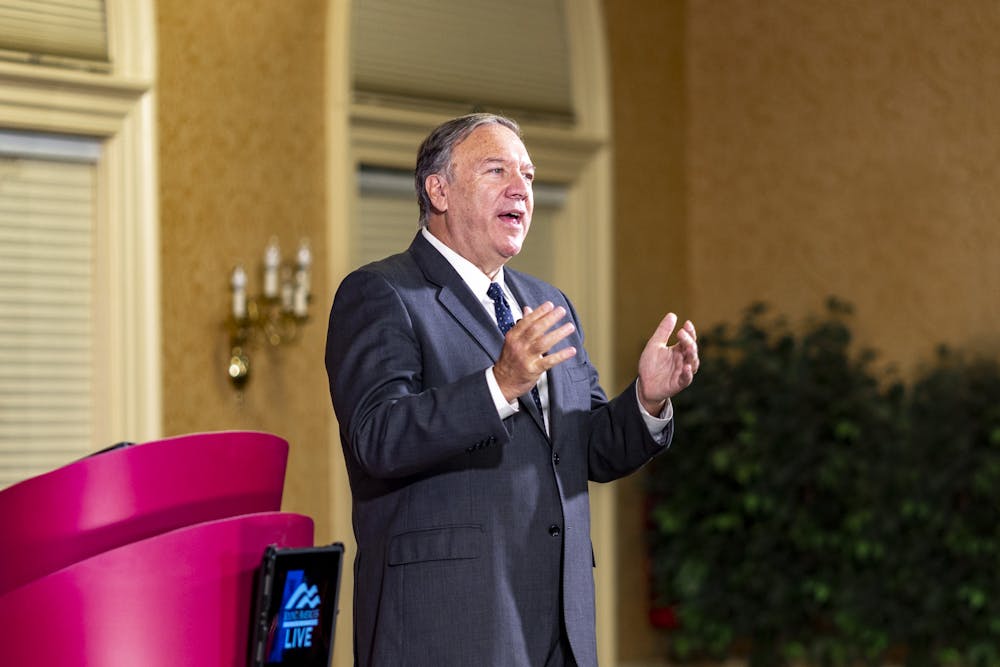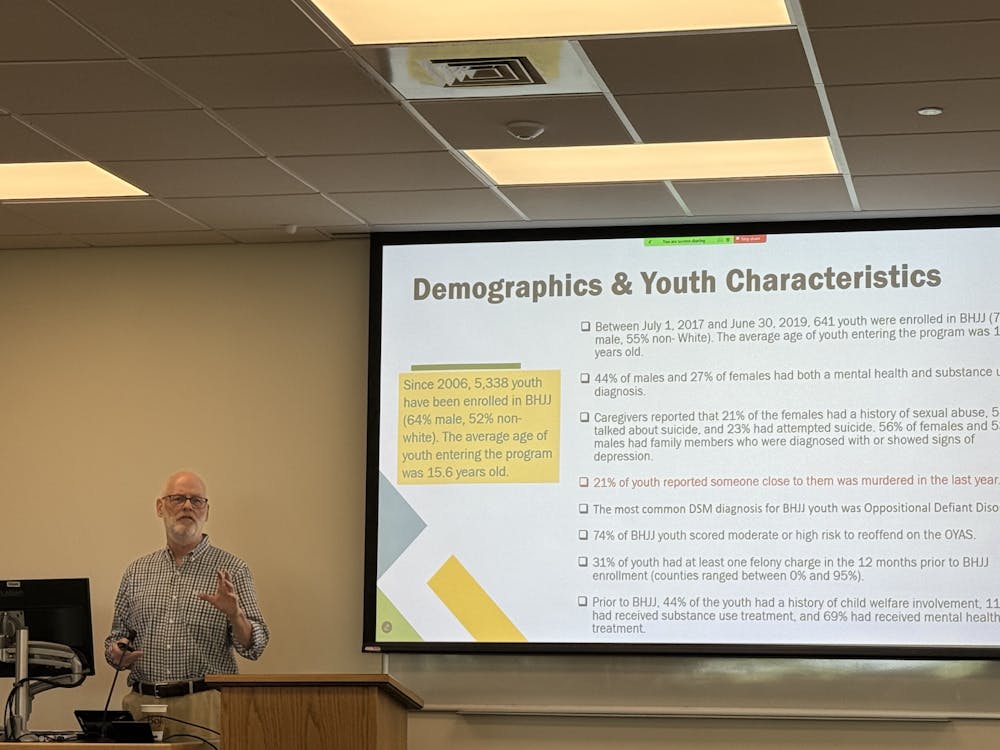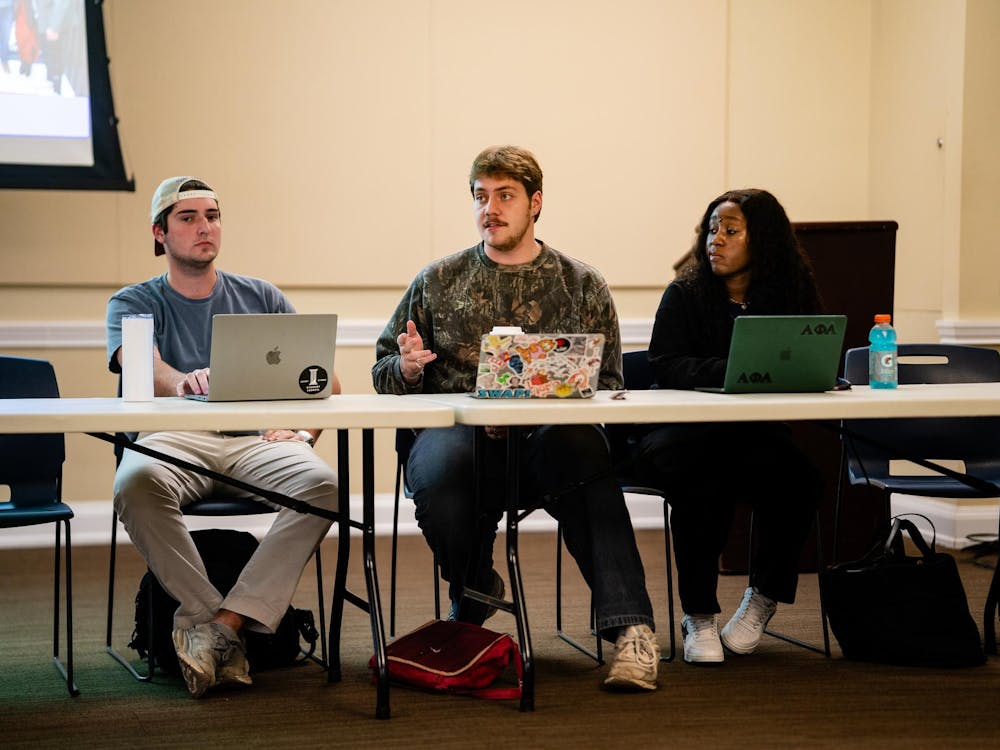Mike Pompeo, the 70th secretary of state and former Central Intelligence Agency director, spoke about the United States’ role on the global stage, the Russia-Ukraine war and southern border security in an address at Alumni Hall Monday. The event, titled “Talk Softly but Carry America with You: Inside Negotiations on the World Stage,” was sponsored by the U.Va. Center for Politics, the Jefferson Council, College Republicans and the Young America’s Foundation.
Pompeo spoke on the importance of foreign perceptions of America, which was a recurring topic in his address.
“The entire world, it is counting on us,” Pompeo said. “Every nation reads every day about the things that we’re doing here… the world is counting on you, the next generation, to carry this forward.”
Another recurring topic in Pompeo’s address was the Biden administration’s handling of the Russia-Ukraine war — Pompeo said that the president and his cabinet have not been able to convince Russian leadership that the costs of war in Ukraine outweigh the benefits.
“The mistake was that we were too afraid of provoking Vladimir Putin,” Pompeo said. “Had they done the right things at the front end, we could have brought this to a conclusion more quickly.”
Pompeo is no stranger to foreign policy. After entering national politics in 2011 with his election to the U.S. House of Representatives from Kansas, he accepted the position of C.I.A. Director in 2017 before assuming office as U.S. Secretary of State in 2018, serving under President Donald Trump.
He was instrumental in international policy changes in the Middle East, such as the establishment of a U.S. Embassy in Jerusalem and negotiating peace between the United Arab Emirates and Israel. Pompeo also visited North Korean President Kim Jong Un, paving the way for Trump to become the first president to do so.
When an attendee asked during a Q&A whether the conflict will continue as a “forever war,” Pompeo said that the federal government continuing to send money to Ukraine incrementally increases the likelihood that the war will be extended. He said that he is dissatisfied with President Biden for continuing to send aid without addressing the nation. President Biden recently requested an additional $24 billion aid package from Congress, and the United States has sent a total of $76.8 billion in aid to Ukraine.
“I have never seen America provide this much resource into a conflict for this long without the American president going to the American people and explaining it to them,” Pompeo said.
Pompeo also spoke on the topic of border security, saying that while Trump’s original plan to build at the Mexican border didn’t occur, the administration took control of the border nonetheless through its “remain in Mexico” policy. The policy, which required migrants to stay in Mexico while they seek asylum status, has received criticism from human rights organizations as being dangerous for migrants.
Another focus of Pompeo’s address was America’s elections. Pompeo did not state his opinion on claims that the 2020 presidential election was fraudulent, which have been stated by Trump and supported by other Republicans. Pompeo said he was not concerned about the integrity of the U.S.’s peaceful transfer of power.
“I don’t think [the peaceful transfer of power] is in danger at all,” Pompeo said.
He added that the election was “straight up,” although he said that foreign interference from China is still a threat.
Pompeo said that having a good voting system is even more important than preventing foreign interference, and said that states that use mail-in voting creates uncertainty surrounding elections. Mail-in and absentee voting became more widespread during the COVID-19 pandemic, prompting arguments about voting regulations against fraud.
“We ought to go back to same-day, in-person voting with an ID card,” Pompeo said.
The Trump administration’s policy actions came up frequently in Pompeo’s speech, and he said that much criticism was directed at the administration’s withdrawal of the U.S. from foreign institutions, including the World Health Organization in 2020 and the United Nations Human Rights Council in 2018. He defended the U.S.’s exit, stating that the institutions were not “delivering their intended purpose.”
Pompeo criticized the WHO for defending Chinese action at the start of the COVID-19 pandemic and refusing to accept the theory that the virus leaked from a lab in Wuhan — scientists broadly reject this theory, and there is no evidence that COVID-19 existed in any laboratory before the outbreak.
“These institutions are broken,” Pompeo said of the organizations the nation withdrew from under the Trump administration. “We shouldn’t be a part of [the WHO].”
Pompeo also discussed non-policy related behaviors of the Trump administration, including the former president's use of X, formerly known as Twitter, more freely.
“You all have seen his Tweets,” Pompeo said. “The single best book that will ever be written is the book that is called ‘you should have seen the ones we didn’t send.’”
Pompeo declined to state which candidate he will endorse for the 2024 Republican primary elections, but said he plans to support the Republican nominee when they are chosen.







